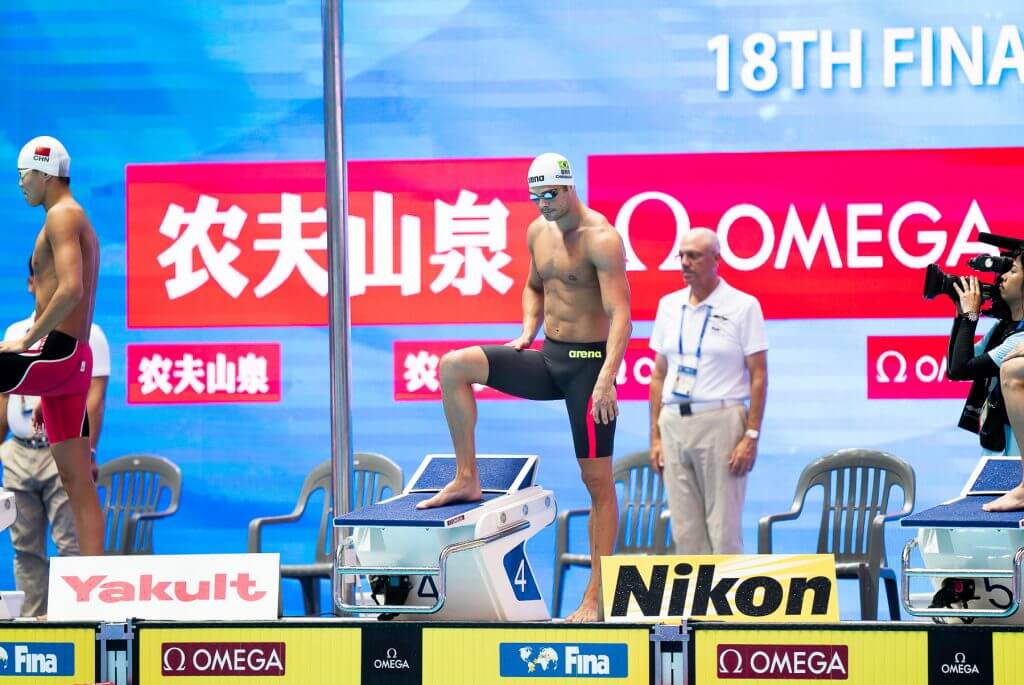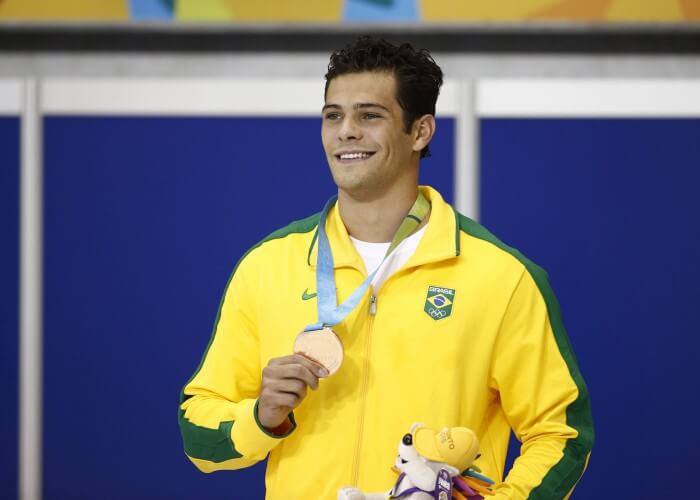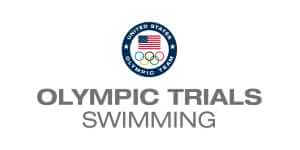After Stellar 2019, Marcelo Chierighini Content to Wait, Improve for Tokyo Games

After Stellar 2019, Marcelo Chierighini Content to Wait, Improve for Tokyo Games
On paper, the postponement of the Tokyo Olympics could not have come at a worse time for Marcelo Chierighini, you might think.
The Brazilian sprinter will turn 30 in January. He’s coming off the biggest win of his career, taking the gold medal at the Pan American Games last summer, outdueling Americans Nathan Adrian and Michael Chadwick. He was entering what was supposed to be an Olympic year in good form, back to setting personal-bests, a victory over rivals in hand.
The circumstances might have left Chierighini lamenting the one-year postponement of the Tokyo Olympics due to the COVID-19 pandemic. But that’s not how he sees it.
Instead, Chierighini is enjoying time at home in Brazil, making the most of the competitive downtime and trying to follow the lead of so many other sprinters who’ve excelled late in their 20s and beyond.
“It’s weird because I’m getting older but I’m enjoying myself more and more,” Chierighini told Swimming World last week. “I’m enjoying practicing. I don’t want to train harder but I want to train smarter, I want to eat healthier, I want to figure out stuff for my body and adjust all the little details. And I’m really enjoying doing that. I enjoy the process of getting better.”
Coming full circle
Marcelo Chierighini has been a fixture on the international stage for the better part of a decade, representing Brazil at the 2012 and 2016 Olympics. His trophy case is loaded with medals from meets like World Championships, Pan Pacs and Pan Am Games. Only one had been an individual medal, though, bronze in the 100 free at the 2015 Pan Ams.

Marcelo Chierighini shows his bronze medal from the 100 free at the 2015 Pan Am Games. It was his most significant individual medal until winning gold in the 100 free at the 2019 Pan Am Games. Photo Courtesy: Rob Schumacher/USA Today Sports Images
He’s qualified for plenty of high-profile individual finals, including the final of the 100 free at each of the last four long-course Worlds. He also made the Olympic final in the event in Rio, finishing eighth.
The long buildup burnished the importance of last summer’s swims. At Worlds, Chierighini finished fifth in the 100, setting a personal-best of 47.76 next to Caeleb Dressel in semifinals. He cracked 48 seconds in all three swims; his previous best was 48.11 dating all the way back to 2013.
He didn’t quite match those speeds at Pan Ams, but absent Dressel, he didn’t need to. Chierighini got the gold in 48.09, Adrian second in 48.17. The impressive double – the Worlds final was July 25 in South Korea; the Pan Ams final took place Aug. 8 in Peru – adds to the achievement.
“I consider that medal one of the most important medals for me,” Chierighini said. “The Pan Ams are not the same level as the Olympics of course or the long-course World Championship. But it was important because we had a few very strong guys. I was competing against Nathan Adrian, Chadwick, a few other guys. That was my first individual gold medal at an international meet and it was right after the world championships, so we were pretty fatigued from all the traveling and competing and I was able to go a good time, almost 47.
“So for me, that was awesome. That was one of the most important medals that I’ve won in my career.”
The meet was emotionally poignant for Chierighini, too. He didn’t start swimming competitively until he was 16 years old. The defining moment in his adolescence was the 2007 Pan Am Games in Rio de Janeiro, remembered for the home country’s dominance, led by Thiago Pereira’s eight medals (seven golds). Between Pereira, Kaio de Almeida and Chierighini’s sprint idol Cesar Cielo, the Brazilian men won 10 gold and 17 total medals in 16 events.
They also won over the passions of Chierighini in the stands.
“Watching that Pan Ams, I was like, ‘damn, that’s something I want to be a part of. I want to swim a relay representing my country with my friends and my training partners,’” Chierighini said. “So it was really special watching Cesar Cielo and some other guys. That gave me a lot of inspiration to start swimming and follow a swimming career.”
That seed of inspiration led Chierighini across the world. He won 14 SEC Championships and two NCAA relay titles at Auburn, named a 22-time All-American and the 2013 SEC Male Swimmer of the Year. He’s worked with some of the best coaches in the world, from Brett Hawke to Sergio Lopez to a return home to Brazil with Alberto Pinto da Silva at Esporte Clube Pinheiros. And he has a third Olympic Games squarely in his sights.
Age is just a number
In many swimming events, age can be disqualifying. For a male sprinter, it’s almost become an advantage.
The reigning Olympic 50-meter freestyle champion is Anthony Ervin, who was 35 in Rio and will turn 40 as he chases a spot in Tokyo. Gary Hall Jr. won the 50 at the 2004 Games a month before his 30th birthday. Cullen Jones took silver in the 50 at age 28 in 2012. The bronze medals in the 100 free at the 2008 and 2012 Games were won by 32-year-old Jason Lezak and 28-year-old Brent Hayden, respectively. (Lezak did some other memorable stuff at that Games.) Adrian, 31 and a cancer survivor, is still a global contender.
So no, the difference between being 29 at the Tokyo Olympics and being 30 doesn’t faze Marcelo Chierighini in the least.
Part of that owes to his late start. Part is a shoulder injury that he finally addressed in 2018 with an aggressive regimen of physical therapy but that he admitted had bothered him since 2014.
It informs how he’s riding out quarantine: At his parents’ home in Itu, an hour outside of central Sao Paulo. He’s gotten dispensation to train at his local pool, and while he’s not hammering out full sets, he’s able to put in more work than just staying in shape.
Chierighini credits the convergence of those two factors – being healthy and being home – as fueling the best times. He cites training in Brazil as “just different” in approach. He’s got more resources, from a full-time nutritionist and physiotherapist to a biomechanics expert. It’s all in the name of working smarter instead of indiscriminately harder. Resolving the shoulder issue was also a wakeup call, forcing him to focus on diet and other ancillary performance factors.
That, and the maturity of having been in high-level finals before, has Chierighini not just ready for the challenge of next summer’s path to Tokyo but enjoying it, too.
“When I was younger, I was like, OK I don’t want to do the little exercises before getting in the water to prevent injuries. I just want to go and swim and that’s it,” he said. “And I didn’t really enjoy the whole process of getting better, and right now, I’m in a really good spot.
“Even though I’m 29, I feel I can still improve and I can’t wait to be able to be able to compete in Olympic Trials and see how fast I can go and hopefully qualify for the Olympics.”


- 2016 USA TRIALS ARCHIVE
- ARCHIVES OF OLYMPIC TRIALS VIA SWIMMING WORLD VAULT
- 2021 USA OLYMPIC TRIALS WAVE I CUTS
- 2021 USA OLYMPIC TRIALS WAVE II CUTS
- HEAD USA OLYMPIC COACHES
- 2016 FULL RESULTS
- WAVE I FULL RESULTS
- PSYCH SHEET
- DAY ONE RESULTS
- DAY TWO RESULTS
- DAY THREE RESULTS
- DAY FOUR RESULTS
- DAY FIVE RESULTS
- DAY SIX RESULTS
- DAY SEVEN RESULTS
- DAY EIGHT RESULTS



